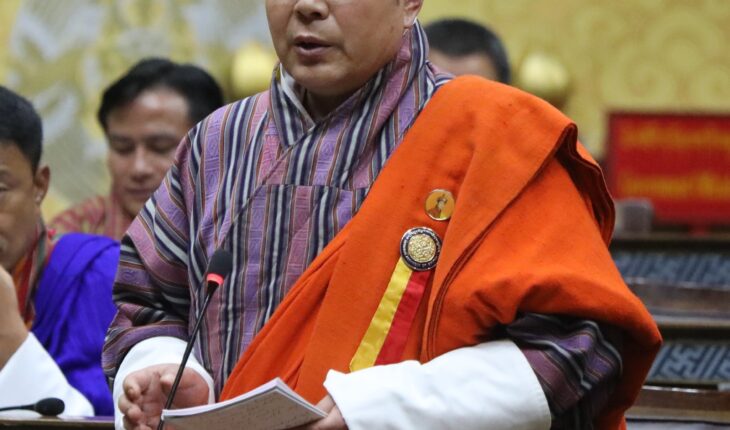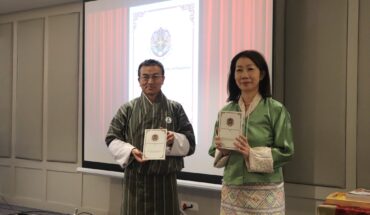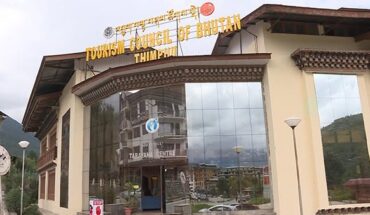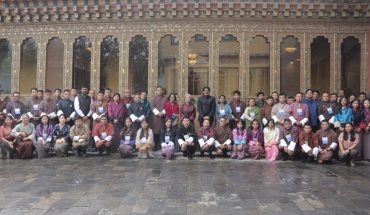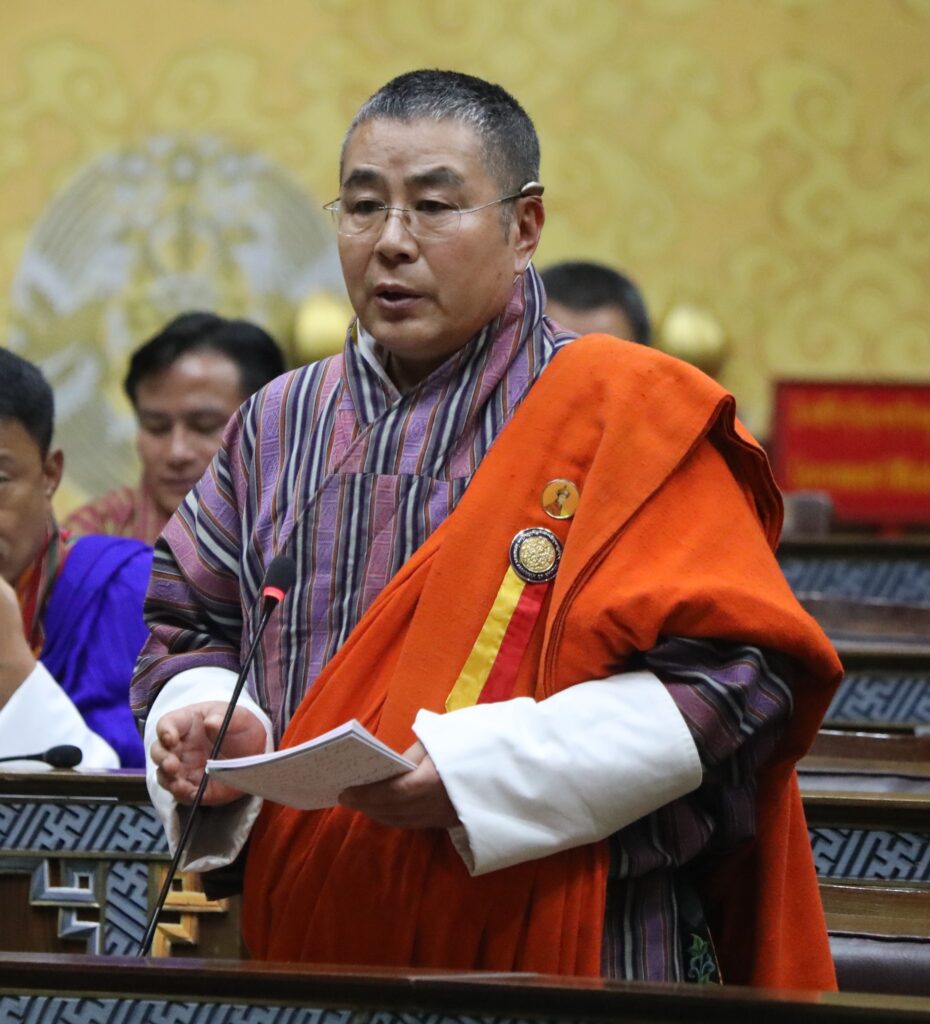
KINZANG DORJI TSHERING
Thimphu
In the ongoing session of the National Assembly, Members of Parliament raised urgent concerns over the worsening state of healthcare services in rural and highland areas of Bhutan, prompting Health Minister Lyonpo Tandin Wangchuk to promise targeted interventions, including infrastructure upgrades, recruitment of medical professionals, and policy reforms.
The first concern was brought forward by the Member of Parliament representing Khatoed–Laya constituency under Gasa Dzongkhag Lhaba Lhaba.
Drawing attention to the dire state of healthcare in Laya, he informed the Assembly that the only hospital serving the region is staffed by just two health assistants and a caretaker, making it extremely difficult to meet the medical needs of the population.
According to the MP, Laya consists of four chiwogs and is home to 1,026 people, many of whom live far from the existing health facility and are compelled to walk long distances for medical attention.
The MP stressed the urgency of establishing a sub-post in Laya to make healthcare more accessible.
He noted that although a permanent road to Laya is under construction and expected to be completed within this year, the current terrain remains challenging, making it difficult for people to reach hospitals on time.
Further, the MP emphasized that despite the limited population, the healthcare system must not neglect these remote communities.
“The people of Laya are not wealthy. They rely on farming and livestock, and given the poor road conditions, we are unable to even build our homes because construction permissions are not easily granted,” the MP said.
Health Minister, Lyonpo Tandin Wangchuk, acknowledged the issues raised and responded by highlighting the Ministry’s ongoing efforts to improve services in remote areas like Laya.
He assured that the road project, started last year, is nearing completion and would significantly ease access once finished.
Lyonpo also stated that although challenges remain due to geographical isolation and lack of infrastructure, the Ministry is working diligently to deploy additional healthcare workers and provide better facilities to underserved regions.
The Minister added, “Even if the road is long and there are few people living there, we must still do our best. If we are able to help even one person, it is worth the effort.”
Other Members of Parliament echoed similar concerns from their constituencies. The Sergithang–Tsirang Toed MP Lhakpa Tshering Tamang, brought up the issue of lack of staff in Basic Health Units (BHUs) across the country.
He stated that in many locations, caretakers are being forced to distribute medicines in the absence of qualified health workers.
In addition, he suggested that one of the primary reasons for this staffing crisis is the low income offered to healthcare employees and the irregular provision of Daily Subsistence Allowance (DSA), which makes such jobs unattractive.
Adding to this, MP from Nganglam, Lamdra Wangdi, stated that the shortage of health workers is a national concern, not limited to one or two dzongkhags. He pointed out that while the health sector is in desperate need of more staff, recruitment numbers remain low.
According to him, many potential healthcare workers are discouraged from entering or remaining in the profession due to the minimal salary and insufficient DSA provisions.
He further emphasized that in remote areas, health workers are expected to be on duty around the clock, and the compensation does not reflect the demands of the job.
Similar grievances were raised by the MP from Thrimshing–Kangpara, Damche Tenzin, who highlighted struggles faced by women in his constituency when seeking medical care.
The MP pointed out that the lack of female health officials in remote areas creates discomfort for female patients, especially when treatment is required at night.
“It is uncomfortable for women to be treated by male health workers during sensitive situations,” he said, appealing to the Health Minister to address the issue by prioritizing gender-sensitive deployment of health staff.
In response, Health Minister Tandin Wangchuk acknowledged that the Ministry is aware of the problems and is making continuous efforts to address them.
He explained that the Ministry cannot recruit healthcare workers arbitrarily and emphasized the need for qualified personnel who have undergone at least three years of formal education in medical sciences.
“We cannot pick people blindly. We need qualified health workers who can make a difference in the long run,” the Minister said. He added that recruitment is being planned with a long-term perspective and that the Ministry is working toward hiring more professionals in the near future.
On the issue of DSA, the Minister clarified that allowances are provided based on the nature of travel. While health workers posted within a gewog do not qualify for DSA, those who are required to travel between dzongkhags are eligible.
Lyonpo also acknowledged the concerns rose by MPs and indicated that the government is reviewing the policy to ensure fairness and better support for staff in difficult postings.
The Health Minister further addressed concerns regarding emergency services. He noted that the country has already put in place a system of emergency health services, which can be accessed at any time.
While admitting that rural areas face logistical challenges, he maintained that the Ministry is trying its best to respond swiftly in cases of emergency.
Regarding the issue raised by MP Damche Tenzin on female healthcare staff, the Minister assured the Assembly that the Ministry is exploring options to deploy more female officials to remote areas.
He recognized the importance of gender-sensitive healthcare delivery and admitted that it is not ideal for women to travel at night or to be treated by male workers in uncomfortable circumstances. “We are trying our best to figure this out,” he said.
The Minister concluded by reiterating that while not all problems can be resolved immediately, the government is taking each concern seriously.
He added that even small progress can have significant impact. “We are trying our best; even if we are not able to solve everything today, we are working to solve it tomorrow.”
The deliberation in the National Assembly served as a stark reminder of the healthcare disparities that persist between Bhutan’s urban centres and its remote settlements.
While the Health Minister’s assurances were welcomed, MPs made it clear that they expect timely execution and visible change.
For the residents of Laya, Tsirang, Nganglam, Thrimshing–Kangpara, and countless other rural communities, the wait for reliable and inclusive healthcare continues.

